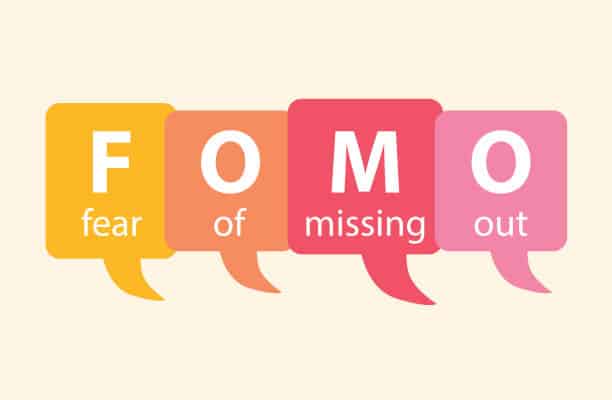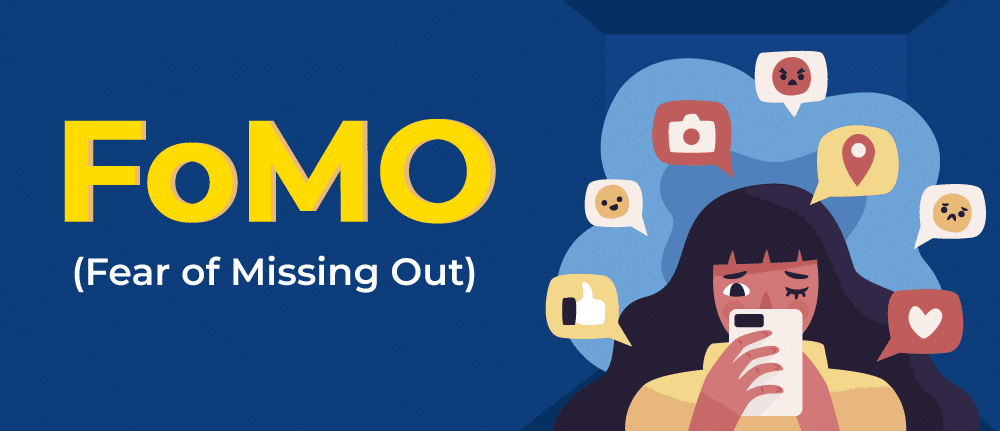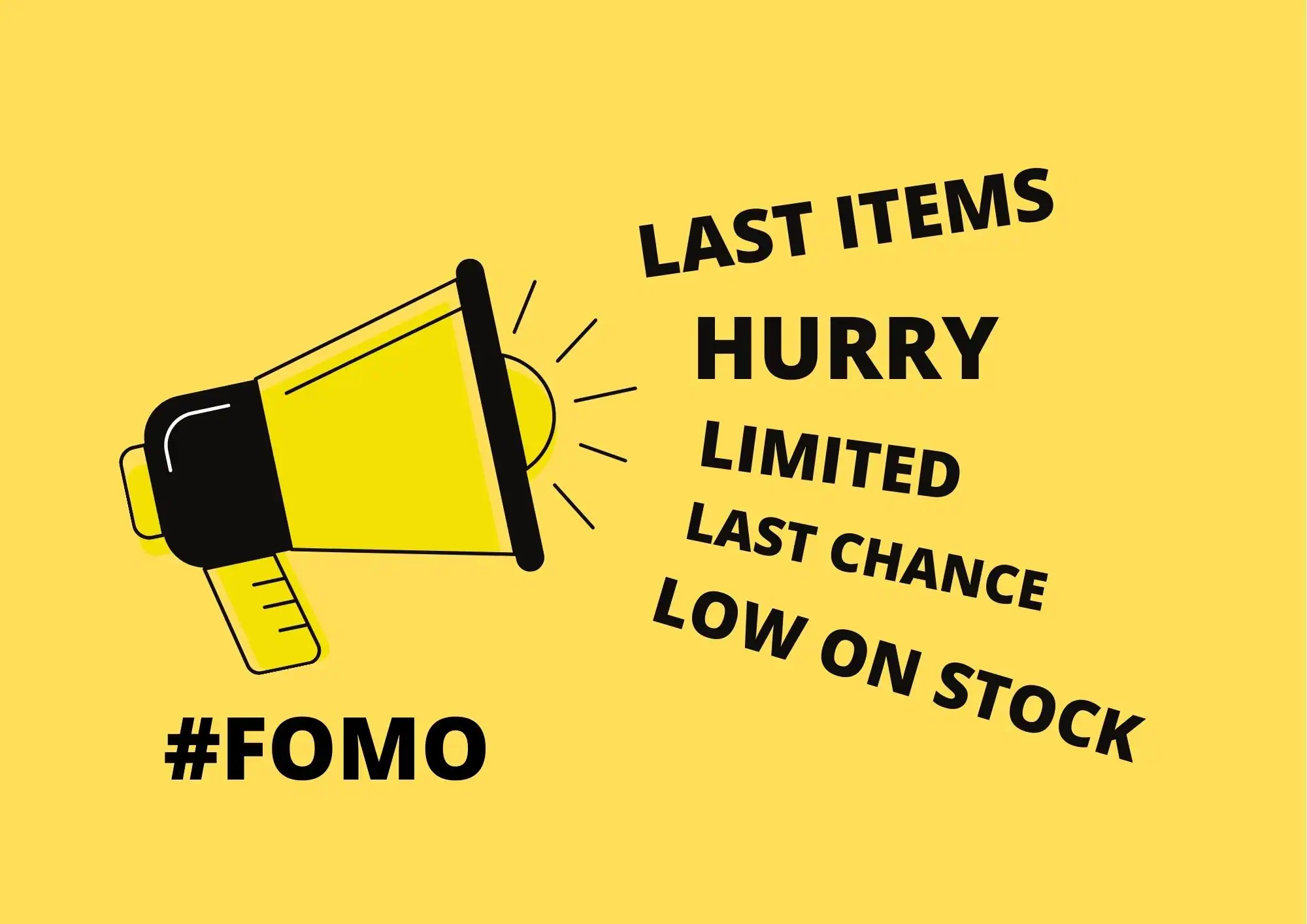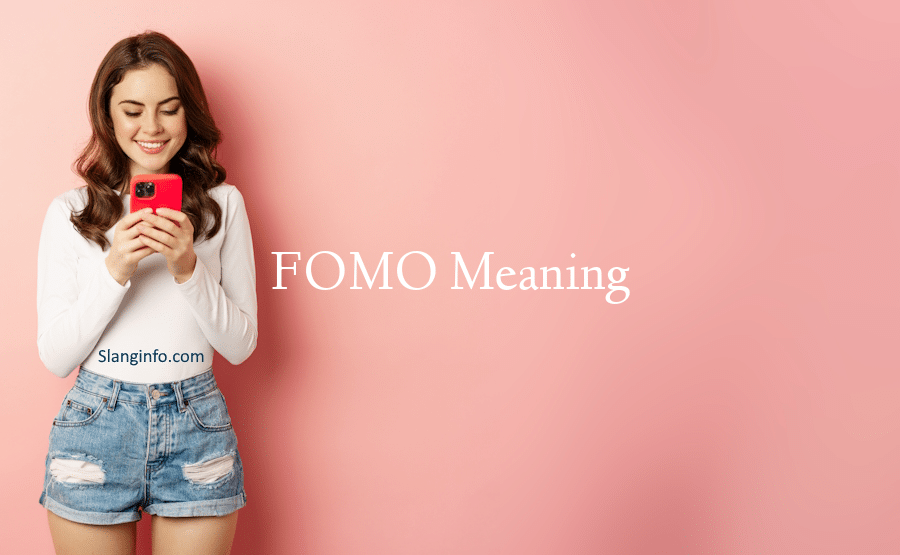Have you ever felt that nagging worry that everyone else is having fun without you? Or maybe you’ve obsessively scrolled through social media, convinced that your friends are living more exciting lives? If so, you’ve experienced FOMO – the Fear of Missing Out. This modern phenomenon has become a significant part of our digital lives, affecting how we interact, make decisions, and even feel about ourselves. Let’s dive into what FOMO really means and why it matters in today’s hyper-connected world.
| Key Takeaways |
|---|
| FOMO stands for “Fear of Missing Out“ |
| It’s characterized by anxiety about missing experiences or opportunities |
| Social media plays a significant role in amplifying FOMO |
| FOMO can impact mental health, behavior, and decision-making |
| Understanding FOMO can help in developing healthier digital habits |

What Does FOMO Mean?
FOMO is an acronym that stands for “Fear of Missing Out.” It describes the anxiety or unease people feel when they believe others might be having rewarding experiences that they’re not part of. This feeling often leads to a compulsive desire to stay continually connected with what others are doing.
The term FOMO was coined by Patrick J. McGinnis in 2004 when he was a student at Harvard Business School. However, the concept itself has been around much longer – it’s just become more pronounced in our digital age.
Also read: Panniculus
Key Characteristics of FOMO:
- Constant connectivity: The need to always be online or checking devices
- Social comparison: Measuring your experiences against others’
- Anxiety: Worry about missing out on important events or opportunities
- Overcommitment: Saying yes to too many things out of fear of missing out
I remember when I first realized I was experiencing FOMO. It was during a quiet weekend at home when I saw Instagram stories of friends at a concert I had declined to attend. Suddenly, my relaxing evening felt inadequate, and I couldn’t shake the feeling that I had made the wrong choice. This experience opened my eyes to how FOMO can creep into our lives and affect our contentment.
Causes of FOMO
Several factors contribute to the rise of FOMO in modern society:
1. Social Media Influence
Social platforms like Instagram, Facebook, and Twitter provide a constant stream of information about what others are doing. This 24/7 window into others’ lives can make us feel like we’re always missing out on something exciting.
2. Increased Connectivity
With smartphones and constant internet access, we’re always aware of what’s happening around us. This awareness can lead to a fear of disconnecting and potentially missing important updates or opportunities.
3. Personal Insecurities
FOMO often stems from deeper insecurities about our own lives and choices. It can be a manifestation of low self-esteem or a lack of confidence in our decisions.
FOMO Triggers
- 📱 Seeing friends’ social media posts about events
- 🎉 Hearing about parties or gatherings you weren’t invited to
- 💼 Learning about career opportunities after deadlines have passed
- 🏖️ Viewing vacation photos from places you wish you could visit
- 🎓 Comparing academic or professional achievements with peers
FOMO in Different Contexts
FOMO doesn’t just affect our social lives; it can manifest in various areas:
- Social Situations: Feeling anxious about missing out on gatherings or events
- Professional Life: Worrying about missed networking opportunities or career advancements
- Consumer Behavior: Making impulsive purchases due to limited-time offers or trending products
- Personal Development: Feeling pressure to constantly learn new skills or take on new hobbies
For example, in the professional world, FOMO might drive someone to attend every after-work event or conference, even if it leads to burnout. In consumer contexts, it might result in buying the latest gadget, even if the old one works perfectly fine, just because “everyone else” seems to have it.

The Psychology Behind FOMO
Understanding the psychology of FOMO can help us better manage its effects. Dr. Lisa Coyne, a senior clinical consultant at the Child and Adolescent OCD Institute, explains:
“FOMO is rooted in the basic human need for connection and belonging. When we perceive that we’re being left out, it triggers feelings of anxiety and inadequacy.”
This fear taps into several cognitive biases:
- Negativity Bias: We tend to focus more on what we’re missing out on than what we’re gaining by our current choices.
- Social Proof: We often look to others to determine what’s valuable or worthwhile.
- Scarcity Mindset: The belief that opportunities are limited can drive us to overvalue experiences we might miss.
For more insights into how our minds work in the digital age, check out our article on the psychology behind viral content.
Understanding FOMO is the first step in managing its impact on our lives. By recognizing its triggers and underlying psychology, we can start to develop healthier relationships with social media, our peers, and ourselves.
Also read: CHEUGY
FOMO and Social Media
Social media platforms play a significant role in amplifying FOMO. The constant stream of curated content showing people’s “best lives” can make us feel like we’re always missing out on something better. Let’s explore how social media contributes to FOMO and its impact on our well-being.
How Social Platforms Amplify FOMO
- Constant Connectivity: Social media provides 24/7 access to others’ activities, making it easy to compare our lives to theirs continuously.
- Curated Content: People tend to share their best moments, creating an unrealistic view of others’ lives.
- FOMO-Inducing Features: Features like Instagram Stories or Snapchat’s disappearing content create urgency to stay constantly updated.
- Social Validation: Likes, comments, and shares can make us feel like we need to participate in trending activities to be socially relevant.
For more insights on how social media affects our communication, check out our article on modern text abbreviations.
Effects of FOMO
FOMO can have significant impacts on our mental health and behavior. Here’s a breakdown of some key effects:
Effects of FOMO on Mental Health
| Effect | Description |
|---|---|
| Increased Anxiety | Heightened feelings of worry about missing social connections or experiences. |
| Social Comparison | Tendency to compare oneself negatively to others, leading to feelings of inadequacy. |
| Low Self-Esteem | Lowered confidence in personal choices or life satisfaction. |
| Depression | Potential onset or worsening of depressive symptoms due to perceived exclusion. |
| Stress | Feeling overwhelmed or burdened by the pressure to always participate in social activities. |
These effects can manifest in various ways, from constantly checking our phones to feeling inadequate about our own lives. It’s crucial to recognize these signs and take steps to manage FOMO effectively.
Also read: HODLER
Overcoming FOMO
While FOMO can feel overwhelming, there are strategies to manage and overcome it. Here are some effective approaches:
- Mindfulness Techniques: Practice staying present and recognizing when FOMO is affecting you.
- Limit Social Media: Set specific times for social media usage to reduce constant comparisons.
- Focus on Gratitude: Regularly acknowledge the positive aspects of your life to shift focus from what you might be missing.
- Be Present: Engage fully in your current activities without distractions from phones or social media.
- Engage in Offline Activities: Find hobbies or interests that keep you fulfilled without needing constant online validation.
For example, I’ve found that setting a “phone-free” hour before bed has significantly reduced my FOMO and improved my sleep quality. It’s a small change, but it’s made a big difference in my overall well-being.
Also read: MYB
FOMO in Marketing and Business

Interestingly, businesses have recognized the power of FOMO and often use it in their marketing strategies. Here’s how some major brands leverage FOMO:
- Nike: Uses limited edition releases to create urgency and exclusivity.
- Apple: Employs scarcity marketing with product launches to generate excitement.
- Amazon: Utilizes flash sales for fast-paced, FOMO-driven shopping experiences.
- Sephora: Partners with influencers for exclusive product releases.
- Coca-Cola: Uses seasonal promotions to encourage immediate purchases.
While these strategies can be effective for businesses, it’s important for consumers to recognize when FOMO is being used to influence their purchasing decisions. Being aware of these tactics can help us make more mindful choices about what we truly need or want.
For more insights on how language and trends affect consumer behavior, check out our article on Gen Z slang.
Cultural Variations of FOMO
While FOMO is a global phenomenon, its manifestation can vary across cultures. Understanding these differences can provide valuable insights into how societal norms influence our experience of FOMO.
FOMO Around the World
- Singapore: “Kiasu” Culture
- “Kiasu” translates to “fear of losing out”
- Drives competitive behavior in education and career pursuits
- Similar to FOMO but more focused on tangible achievements
- Japan: “Seken-nami”
- Concept of conforming to societal expectations
- Can lead to FOMO-like behaviors to fit in with peers
- Nordic Countries: “Janteloven”
- Cultural norm discouraging individual success over collective well-being
- May reduce FOMO related to personal achievements
- United States: Individualistic FOMO
- Often centered around personal experiences and social status
- Heavily influenced by social media culture
For more on how cultural differences affect communication, check out our articles on Australian slang and British slang.
Generational Differences in FOMO
FOMO affects different generations in unique ways:
FOMO Across Generations
| Generation | FOMO Characteristics |
|---|---|
| Gen Z | High social media usage, fear of missing trends or social connections |
| Millennials | Career and lifestyle FOMO, balancing personal and professional life |
| Gen X | Work-life balance FOMO, keeping up with technology |
| Baby Boomers | FOMO related to retirement activities, staying connected with family |
The Future of FOMO
As technology continues to evolve, so too will our experience of FOMO. Here are some predictions for the future:
- Virtual Reality (VR) FOMO: As VR becomes more prevalent, we might experience FOMO related to virtual experiences and events.
- AI-Driven Personalization: AI algorithms might help reduce FOMO by curating content that’s truly relevant to us, rather than showing us everything we’re missing.
- Digital Wellbeing Focus: More platforms may introduce features to help users manage their FOMO and digital consumption.
- JOMO (Joy of Missing Out): There might be a cultural shift towards valuing disconnection and personal time, countering FOMO.
- Augmented Reality (AR) Integration: AR could blur the lines between physical and digital experiences, potentially creating new forms of FOMO.
For insights on emerging digital trends, check out our article on emojis and their meanings.
Conclusion
FOMO, or the Fear of Missing Out, is a complex psychological phenomenon that has been amplified by our digital age. While it can lead to anxiety, stress, and unhealthy behaviors, understanding FOMO is the first step in managing its impact on our lives.
Key takeaways:
- FOMO is a natural human response to perceived exclusion
- Social media plays a significant role in exacerbating FOMO
- Cultural and generational factors influence how we experience FOMO
- Strategies like mindfulness and digital detoxes can help manage FOMO
- The future of FOMO will likely evolve with technological advancements
Remember, it’s okay to miss out sometimes. In fact, embracing JOMO (Joy of Missing Out) can lead to greater contentment and personal growth. By being mindful of our digital habits and focusing on what truly matters to us, we can navigate the connected world without falling prey to constant FOMO.
Also read: Anxiety
As we continue to explore the impact of digital culture on our lives, it’s crucial to stay informed and adaptable. For more insights on modern communication and internet culture, check out our articles on ROFL meaning and LOL meaning.
By understanding FOMO and its effects, we can make more conscious choices about how we engage with technology and social media, leading to healthier, more balanced digital lives.







